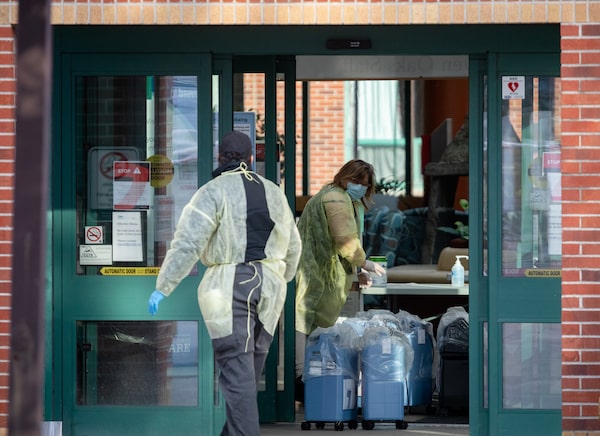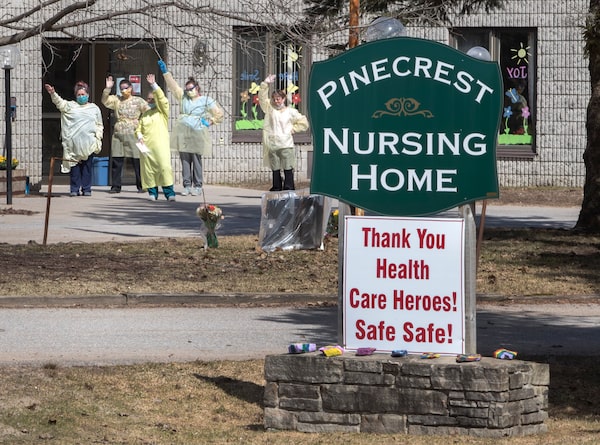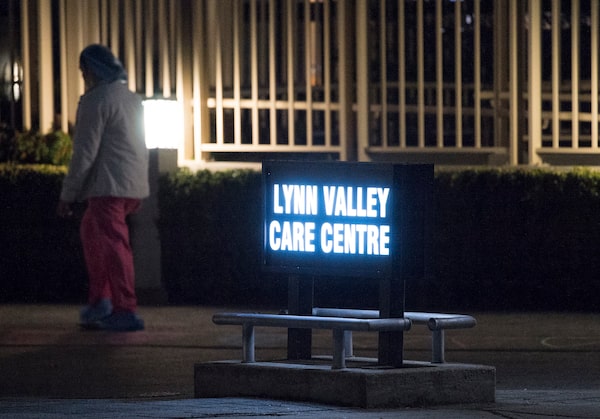
A Medigas worker delivers new oxygen concentrators to the Seven Oaks long term care home in Scarborough, Ont., where several residents have died due to COVID-19 and dozens more are infected, on April 1, 2020.Melissa Tait/The Globe and Mail
The new coronavirus has invaded at least 600 nursing and retirement homes across Canada, including hundreds in Quebec, a situation that has overwhelmed front-line caregivers and left frightened families scrambling for information about loved ones they can’t visit.
Canada’s coronavirus epidemic has caused more devastation in seniors’ homes than anywhere else in the country, with at least 75 known COVID-19 deaths among residents of such facilities, according to a tally done by The Globe and Mail after contacting provincial and local health authorities.
On March 13, Prime Minister Justin Trudeau told any Canadians abroad “it is time for you to come home.”
Who needs to self-isolate:
- The government asked all Canadians returning from any international travel to self-isolate.
- Anyone who has come in close contact of someone diagnosed with COVID-19 must also self-isolate.
What is self-isolation:
Self-isolation requires you to stay at home, monitor for symptoms, and avoid contact with other people for 14 days, according to the Government of Canada website.
Expectations for those in self-isolation:
- Stay home from work and school; avoid public transit;
- Have supplies such as groceries dropped off at your door;
- Keep a two-metre distance from other people;
- Stay clear of elderly people and anyone with compromised immune systems or chronic conditions.
And some tips to maintain your health and wellness:
- Give your days some structure: Shower and put on jeans, says Lia Grainger. If you work from home, make a separate space for work. Try meditation.
- Don’t just binge Netflix; lift a little: Paul Landini suggests body-weight exercises, or skipping rope to get in some cardio.
- When you do need a break, try one of these 10 books that offer lessons from past pandemics or consult Barry Hertz’s guide to the best Canadian streaming options.
Additional Globe resources:
- If you think may have the new coronavirus, here’s what to do.
- Healthy pantry staples to stock up on and other items to purchase.
- How to manage your anxiety and keep up a fitness routine.
- A visual guide to how you can help “flatten the curve.”
Need more answers? Email audience@globeandmail.com
Among the hardest hit are the 65-bed Pinecrest Nursing Home in the Ontario cottage-country town of Bobcaygeon, where 14 residents have died; the Lynn Valley Care Centre in North Vancouver, where at least 11 have died, and the Notre-Dame-de-la-Merci personal care home in Montreal’s Ahuntsic-Cartierville borough, where seven seniors have died.
Seven Oaks, a 259-bed long-term-care home owned by the City of Toronto, announced six new deaths on Wednesday, bringing the total to eight.
Staying away from seniors’ homes is now “a question of life and death,” Quebec Premier François Legault said on Wednesday as his government revealed that 519 of the province’s 2,200 seniors’ homes have at least one case of COVID-19.
How the coronavirus took North Vancouver’s Lynn Valley Care Centre
Alberta health officials say 11 dead after COVID-19 outbreaks; dozens test postive at seniors’ homes
That is 109 more assisted-living complexes and personal-care homes with cases than Quebec reported on Monday.
The novel coronavirus has gained a foothold in so many nursing and retirement homes across the country that front-line caregivers – many of whom have fallen ill with COVID-19 symptoms – and public-health officials are struggling to protect residents who are not already infected.
COVID-19 is deadliest in people over 80, and the virus that causes it has whipped through seniors’ facilities.
“Long-term-care homes are literally begging us to redeploy [personal support workers] out to them," said Miranda Ferrier, president of the Ontario Personal Support Workers Association. “It is a very dire situation.”
The experience of a Washington State nursing home caught off-guard by the coronavirus in late February provides a chilling glimpse of what could lie ahead in Canada.
As of March 18, there were 167 confirmed cases associated with the Seattle home – 101 in residents, 50 in staff and 16 in visitors, according to a report in the New England Journal of Medicine.
One-third of the infected residents died. Seven who tested positive showed no symptoms.

The 65-bed Pinecrest Nursing Home in Bobcaygeon, Ont., seen here on April 1, 2020, is among the hardest hit nursing homes in Canada. Fourteen residents have died of COVID-19 there.Fred Thornhill/The Canadian Press
One of the reasons COVID-19 outbreaks have been difficult to control in nursing homes is the way it sometimes presents itself in the old and sick.
The elderly tend to have weakened immune systems, meaning they don’t always spike a high fever when their bodies struggle to fight off an infection, said Samir Sinha, director of geriatrics at Sinai Health System and University Health Network in Toronto.
If they feel ill, he added, they aren’t necessarily capable of communicating it. He said 70 per cent of people in nursing homes have dementia. "The chances are they might not be able to recognize the symptoms they are having and be able to clearly articulate what they’re actually feeling,” Dr. Sinha said.
For the relatives of people in long-term care, it has been difficult to get information from short-staffed homes battling outbreaks.
Violet Bell was unable to speak directly to her mother, Janet Jagan, 90, for more than two weeks after learning that the coronavirus had been confirmed in some residents on the third floor of Seven Oaks.
Ms. Bell, who lives in Texas, called the main office and the nursing station several times daily — the only way she could get updates on her mother’s condition.
"There were nights I did not sleep well because I was fearing the worst,” Ms. Bell said in an interview on Wednesday morning. "God forbid, she may have passed away and they’re not telling me. My mind went to the worst because I could not get a hold of anyone.”

A worker is seen outside the Lynn Valley Care Centre in North Vancouver, on March 25, 2020, where at least 11 have died of the novel coronavirus.JONATHAN HAYWARD/The Canadian Press
When Toronto Public Health announced the six deaths at Seven Oaks later on Wednesday, Ms. Jagan was not among them. She spoke with her daughter by phone for one minute on Wednesday.
The federal government is not tracking the number of nursing and retirement homes with coronavirus outbreaks at a national level. (Canada has had a total of 111 deaths from COVID-19.)
British Columbia is reporting cases of COVID-19 in 21 homes, with 11 deaths, all at Lynn Valley.
Alberta has COVID-19 cases in four long-term care facilities, including the McKenzie Towne Long Term Care Home in Calgary, where four residents died and 43 tested positive.
Saskatchewan has not recorded any cases at public long-term care facilities, but does not have data on private facilities, while Manitoba says no residents of its seniors’ homes have tested positive.
In Ontario, it is unclear how many nursing homes have outbreaks of COVID-19 because the provincial government does not collect that data and release it in one place.
The Globe contacted all of Ontario’s public health units on Wednesday and learned of at least 40 deaths of residents of long-term-care homes due to the virus.
At least 53 seniors’ facilities have had at least one case of COVID-19 in residents or staff.
In Quebec, where 519 homes have one or more cases, at least 21 of the province’s 33 COVID-19 deaths have been among residents of seniors’ homes, according to numbers published by the province’s 18 health districts.
Nova Scotia has confirmed COVID-19 among residents or staff in three homes.
Newfoundland and Labrador and Prince Edward Island are not reporting any outbreaks in seniors’ homes.
New Brunswick did not respond to a request for data.
In Ontario, the government and Chief Medical Officer of Health David Williams are revising widely criticized policies that limited the testing and tracking of COVID-19 cases in long-term care.
Now, anyone in a long-term-care home with symptoms of COVID-19 — resident or staff — must be tested, including recently deceased residents who were part of an outbreak.
The province had been adhering to a policy, usually deployed during influenza outbreaks, under which it was assumed that all residents with respiratory symptoms had COVID-19 after three had tested positive.
“We are very concerned about outbreaks in long-term-care homes," Ontario Health Minister Christine Elliott said. “That’s a very, very vulnerable group of people that we need to protect…there’s more that we can do.”
She said the province may relocate residents to hotels if necessary to keep them isolated.
Quebec Health Minister Danielle McCann said her “greatest concern,” is the number of outbreaks in seniors’ homes, where visitors have been banned with few exceptions since the middle of March.
“This is why we’ve been driving home the message that there can be no more visits.”
With reports from Andrea Woo, James Keller and Laura Stone
Prime Minister Justin Trudeau says thousands of suppliers answered a federal call for companies that can make gear and commodities Canada needs to treat people with COVID-19. The government is putting up $2 billion to buy personal protective equipment for health workers and medical equipment such as ventilators.
The Canadian Press
Sign up for the Coronavirus Update newsletter to read the day’s essential coronavirus news, features and explainers written by Globe reporters.
 Kelly Grant
Kelly Grant Les Perreaux
Les Perreaux Jill Mahoney
Jill Mahoney